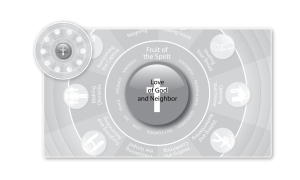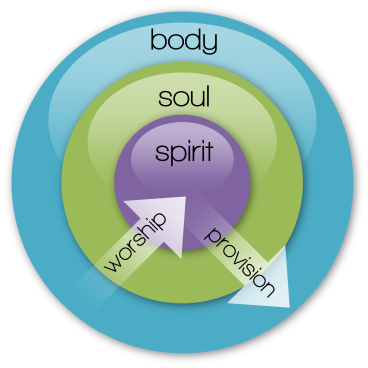Part XI of our series on Preparation
We concluded our last post by noting the importance of the Works of Mercy in training our body.
But before we continue, we need to make one thing clear that so often gets muddied in today’s change-the-world Christian climate.
We are not called to originate the Works of Mercy. That would yield what Paul in Galatians 5:19-21, NIV, calls “the acts of the flesh”:
“The acts of the flesh are obvious: sexual immorality, impurity and debauchery; idolatry and witchcraft; hatred, discord, jealousy, fits of rage, selfish ambition, dissensions, factions and envy; drunkenness, orgies, and the like. I warn you, as I did before, that those who live like this will not inherit the kingdom of God.”
Initially it is hard to imagine how focusing on trying to do good could lead to all these bad things.
But James 1:17, NIV, says, “Every good and perfect gift is from above, coming down from the Father of the heavenly lights, who does not change like shifting shadows.”
The root of trying to originate Works of Mercy (rather than pass on the ones we have received from Christ) is the Original Sin of Genesis 3:4: trying to be like God rather than carrying out our purpose of glorifying God by passing on what we have received from him.
We need to retrain our souls and spirits to receive and pass on good gifts, not to generate them. This is counterintuitive to the degenerate human mind.
When we “seek first his Kingdom and his righteousness” (that’s Matthew 6:33, NIV, which shows the body receiving from the soul and the soul receiving from the spirit, by the way), then our bodies receive all the good gifts they need. And our hearts are retrained to desire the good things God wants, and to desire to pass them to others in the way we have received them.
That means the body is the indispensable third part of the tripartite human form that mirrors God’s Trinitarian being:
- body – Christ, the visible image of the invisible God
- soul – mind, will, and emotion in alignment with God’s will, passing things from spirit to body and from body to spirit, which corresponds with the Holy Spirit
- spirit – the seat of the divine life unique to the human being, which corresponds to the Father
Notice how the proper relationship is for spirit to pass on to soul and soul to pass on to body (that’s our provision), and then for body to offer to soul and soul to offer to spirit (which is our worship). One is not above the other, contrary to the way we Greek-influenced Western types usually think about it, where we see body as lower and spirit as higher. But we’re modeled after the Trinity, so we need to derive our thinking about body, soul, and spirit from the relationships in the Trinity, not the other way around.
The Scripture makes clear that we are not to hurt ourselves or neglect our bodies, minds, will, or emotions. Instead, we are to receive and pass on the gifts for the soul and the body that God provides to us through the Holy Spirit. We’re to care equally for each of the three parts that compose us. That’s a message the church doesn’t share very often, unfortunately.
The Works of Piety are the good gifts for our soul that keep our mind, will, and emotions in proper relationship to our spirit (“hearing the Word”):
- Searching the Scripture
- Learning
- Worshiping
- Praying
- Self-denial
- Serving
- Giving
The Works of Mercy are the good gifts for our body that keep it in proper relationship to our soul and spirit (“doing the Word”):
- Doing good to your enemies
- Sharing your bread
- Opening your home
- Visiting and remembering
- Healing and comforting
- Proclaiming the Gospel
- Forgiving and reconciling
- Making disciples
- Ransoming the captive
- Reigning
The Works of Piety and The Works of Mercy remind us that God’s grace is even greater than forgiveness—forgiveness is just one of many precious gifts he gives us so that we can accomplish our purpose of receiving and handing on to the visible realm all that he is and does in the invisible realm.
How does this shift in thinking keep good works from resulting in bad things?













Doing good can result in bad consequences. This has been the story of the global aid movement where Western do-gooders attempt to help African countries move out of poverty by supplying material needs, as if the solution to poverty is solely the lack of material resources. The solutions have perpetuated the problem. It’s colonialism all over again! Dittos for our domestic approaches to poverty whether by government aid or any other approach that does not involve building relationships with people for Christ.
The 7 Works of Piety and 10 Works of Mercy keep us focused on the Dao of Jesus. Instead of disastrous, donor-centered, charities we have Christians discipling others to maturity in Christ. We see how Jesus did each of these things for us before we share with others. They don’t see us or our big ministry budgets, but the true Philanthropos.
Jesus preached the word! Then was moved to compassion when He saw the multitude was hungry and feed then. It is very sad African Countries are going throught some much poverty. Somehow I agree with you! But they need help….We can sponsor a child throught “Compassion International.” One at the time. It is a very rewarding experience!!!
Pingback: Why The Lord’s Supper is More Extraordinary Than You Thought | Rev. Eric Foley
Pingback: Do Not Work for Food That Spoils | Rev. Eric Foley
Good prayer! A mirror cannot reflect anything without being exposed to light!